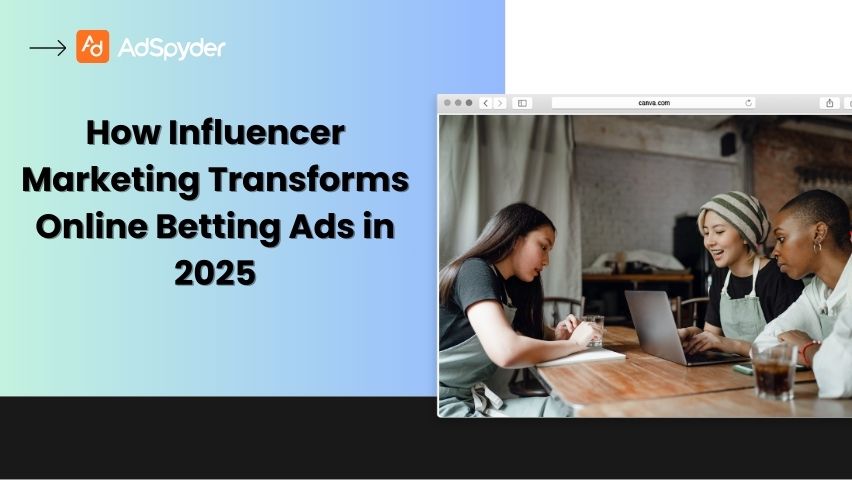The online betting landscape is ever-growing, evolving, and commercializing, and advertisers have always been actively seeking means to reach into and enthral audiences and promote their platforms. One increasingly domineering face of influencer marketing has been championed in recent times. This article highlights how influencer marketing is changing the face of betting advertisement strategies. It investigates how influencer marketing provides social validity, leverages user-generated content, evaluates and measures campaign effectiveness, ensures compliance, and presents future trends. This article delves into the transformative impact of Influencer creating video ads in betting advertising strategies. It explores how influencer marketing builds trust, leverages user-generated content (UGC), measures campaign success, ensures compliance with regulatory guidelines, and offers insights into future trends.
Ready to Elevate your Marketing Strategy?
The Role of Influencer Marketing in Gambling Advertising

Influencers come in by endorsing gambling via personal recommendations and making engaging content. Their interpersonal connection with followers makes them trustworthy and the audience will be inclined toward betting platforms.
Building Trust and Credibility for Betting Sites
Influencers are capable of impacting perceptions and actions within their vast online audiences. Their endorsement of online betting sites imparts credibility and trustworthiness to the brand. Their endorsement is something followers tend to hook up with–and that’s why influencer marketing is so effective.
A study by GamblingSites.org reveals that a whopping 80% of internet users place more trust in the recommendations of influencers than in traditional ads.
- Genuine Recommendations: Followers view influencer recommendations as honest and reliable, leading to higher acceptance and conversion rates.
- Study Insights: A study by GamblingSites.org reveals that 80% of internet users trust influencer recommendations more than traditional ads, highlighting the power of influencer marketing.
- Increased Visibility: Leveraging influencers can significantly boost the visibility of online betting sites within target demographics.
- Targeted Audience: Influencer marketing strategies allow brands to reach specific audiences more effectively, ensuring marketing efforts are focused and efficient.
- Cost-Effectiveness: Traditional advertising focuses on broader audience. In comparison, influencer marketing can be more niche audiences. This offers better ROI for online betting brands.
Future Trends in Influencer Marketing
- Integration of AR with Influencer Campaigns: Combining influencer marketing with AR can create unique and compelling campaigns that stand out in the crowded online betting market.
- Evolving User Preferences: As technology advances, user preferences continue to evolve, making it crucial for online betting brands to stay ahead with innovative marketing strategies.
- Data-Driven Decisions: Leveraging data analytics to measure the success of influencer and AR campaigns can provide valuable insights for future marketing efforts.
-
- Immersive Experiences: AR creates engaging and interactive experiences that capture users’ attention in a way traditional ads cannot.
- Enhanced User Engagement: AR advertising keeps users engaged longer, providing a memorable and immersive experience that can lead to higher retention rates.
- Redefining Strategies: Our article on Augmented Reality Advertising in online gambling sites explores how AR is revolutionizing advertising strategies in the gambling sector, offering new ways to attract and retain customers.
Table: Influencer Marketing Platforms
| Platform | Key Features | Best For |
| High visual impact, stories, IGTV | Fashion, beauty, lifestyle | |
| YouTube | Long-form content, tutorials, unboxings | Tech, education, entertainment |
| TikTok | Short-form videos, viral content potential | Gen Z, creative industries |
| Short updates, engagement through retweets | News, real-time updates, tech | |
| Professional network, B2B marketing | Business, professional services |
Selecting the Right Influencers for Betting Ad Partnerships
Selecting the right influencers is crucial in determining the success of betting ad campaigns. Factors, including audience demographics, engagement metrics, and an influencer’s reputation, must be considered. Micro-influencers can be especially effective for niche betting platforms, even though they have smaller but highly engaged audiences.
Mediakix’s research indicates that 60% of online casino operators have included influencer marketing in their marketing mix.
Partnering with influencers who share similar values to those of the company promotes a real collaboration that resonates with the audience
Factors for Influencer Selection:
While selecting influencers to create content for running Linkedin ads, you need to be smart about it. Here are some criteria to consider while shortlisting the right influencers for your betting ads:
- Audience demographics: Understanding the demographics of an influencer’s audience helps in targeting the right market segment. Having a clear understanding about who your audiences are helps you narrow down the list of influencers who are influential in the same circles.
- Engagement metrics: Beyond follower count, engagement metrics like likes, comments, and shares indicate genuine interest and interaction. Having the right engagement metrics for your shrtlisted influencers can ensure better traction among your target audience.
- Influencer reputation: Assessing an influencer’s reputation ensures alignment with the brand’s values and credibility. Influencers shortlisted should be aware of what your brand stands for. Likewise, the brand needs to be aware of the influencers’ reputation to avoid potential risks in the future.
The Rise of Micro-Influencers
Micro-influencers, are those who typically have follower counts ranging from 1,000 to 100,000. They are gaining traction in the betting industry.
- Unlike macro-influencers or celebrities, micro-influencers foster more personal and direct relationships with niche audiences. This often leading to higher engagement rates.
- Betting brands are increasingly collaborating with these influencers due to their ability to create authentic, relatable content that resonates with specific betting communities, such as sports betting enthusiasts or eSports fans.
Higher Engagement Rates
Micro-influencers tend to have closer connections with their followers, resulting in higher engagement rates compared to their larger counterparts.
- This intimate relationship builds trust, making them ideal for promoting betting platforms in a genuine way.
- It also helps improve the reach of both the influencer and the brand. This is possible due to piggybacking of each others’ success.
Niche Audience Targeting
Micro-influencers often focus on specific niches, such as football betting, poker, or eSports.
- Brands can leverage these influencers to reach highly targeted and relevant audiences, ensuring their message aligns with the interests of the followers.
- This leads to more focused conversions without any increase in marketing spending.
Cost-Effectiveness
Compared to macro-influencers or celebrity endorsements, micro-influencers are more cost-effective.
- Their campaigns typically require lower budgets.
- This allows smaller betting brands or those with limited marketing resources to gain access to influencer marketing without overspending.
Authenticity and Trust:
Followers view micro-influencers as relatable individuals rather than distant celebrities.
- Their authentic approach to content creation leads to increased credibility.
- This is particularly important in industries like online betting, where trust plays a significant role in user engagement.
Long-Term Partnerships:
Micro-influencers often engage in long-term collaborations with brands.
- These sustained partnerships ensure consistent messaging and help build stronger brand affinity.
- This leads to higher conversions and loyalty from their audience.
- It also contributes to each others’ success.
Micro-influencers are becoming essential in betting marketing strategies due to their ability to engage niche audiences, offer authenticity, and provide cost-effective solutions. As the industry becomes more competitive, betting brands that capitalize on these trends will be better positioned to drive meaningful engagement and conversion.
Effective Influencer Campaign Strategies in the Gambling Industry
Choosing influencers that share the same values as the brand and a common target audience will yield a higher engagement rate. Engaging, interactive campaigns about the like of live betting sessions or challenges would ensure visibility and user participation.
- Tailored Sponsored Content: Influencers create sponsored content like product reviews, gameplay experiences, and exclusive betting offers, catering specifically to their audience’s interests and preferences.
- Enhanced User Engagement: The integration of influencer campaigns with organic content on social media platforms fosters higher levels of user engagement.
- Reduced Ad Fatigue: By blending seamlessly with organic content, influencer campaigns help minimize ad fatigue among the audience.
- Higher Click-Through Rates: According to Later’s “Influencer Marketing Benchmark Report 2022,” influencer marketing campaigns within the online gambling sector exhibit a 20% higher click-through rate (CTR) compared to traditional advertising.
- Effective Marketing Strategy: Leveraging influencer marketing proves to be an effective strategy for online gambling companies to reach and engage their target audience.
Engaging Audiences through Social Media Collaborations and Sponsored Content
Social media is one of the most prominent channels for influencer marketing campaigns in the gambling sector. An influencer writes sponsored content product reviews, an experience of gameplay, and special betting promotions based on the interests of their audience. These campaigns blend very seamlessly with organic content, enabling higher user engagement during periods when ad fatigue is low.
According to Later’s “Influencer Marketing Benchmark Report 2022,” influencer marketing campaigns in the online gambling sector enjoy a 20% better click-through rate than traditional advertising.
Harnessing Contests and Giveaway Campaigns

Contests and giveaways are often leveraged by influencers to promote online betting sites. By holding exclusive competitions with exciting rewards, influencers encourage their audiences to engage with the brand actively. This generates excitement, and draws in a new user base, further cementing community around the betting platform.
Leveraging User-Generated Content (UGC) with Influencers
Creating opportunities for followers to share their personal betting experience will provide influencers with a platform through UGC. This paves the way for community-led sharing, which is especially relevant in terms of authenticity and social proof.
- Fostering Authentic Engagement:Influencers inspire genuine connections by sharing their own betting experiences. This creates a platform for users to engage with the brand and try out their offerings.
- Building Community Participation:Organising initiatives like hashtag challenges and contests plays a key role in empowering users to contribute to the brand’s narrative. These initiatives fosters a sense of community and belonging among the target audiences.
- Driving Customer Acquisition:Research indicates that influencer marketing can contribute up to 30% of new customer acquisitions in the online gambling sector. This shows its effectiveness as a marketing strategy.
- Integrating Brand Narratives:Influencers seamlessly integrate brands into their content. This helps in providing a genuine authentic representation of the brand message that resonates with their audience.
- Establishing Trust and Credibility:Followers trust influencers’ recommendations and experiences. This leads to higher engagement and conversion rates for betting platforms.
Influencers act as catalysts for UGC, motivating their followers to participate and share their experiences. Betting platforms can leverage influencer networks to expand the reach of UGC, ensuring wider exposure and heightened user engagement. Integrating UGC into influencer campaigns strengthens social proof and bolsters trust in the brand.
Encouraging User Participation and Content Creation
Influencers are incredibly important catalysts for user-generated content (UGC). They are instrumental in getting their followers to share their betting experiences and wins, thus being something that is a great substitute for the authenticity of the ad campaign. For example, betting sites may also carry out hashtag challenges or contests that encourage people to join in the storytelling on behalf of the brand.
GamblingCompliance’s report titled “The Impact of Influencer Marketing on Online Gambling” shows that influencer marketing campaigns account for up to 30% of customer recruitment in the online gambling sector.
Amplifying UGC through Influencer Networks
Influencers act as catalysts for UGC, motivating their followers to share their experiences. Betting platforms can then take advantage of these influencer networks, amplifying the reach of UGC. This ensures a far-reaching and more expansive audience. Infusing influence campaigns with UGC elevates social proof and trust in the brand.
Measuring the Impact of Influencer Marketing
Data associated with the influencer campaigns such as engagement, conversion, and customer acquisition metrics provide an understanding of the ad’s effectiveness. Conducting a data-driven analysis is essential for ensuring the ongoing success of future campaigns.
Tracking ROI and Performance Metrics
The effectiveness measurement of influencer campaigns provides a basis for actualizing their intended effect towards brand growth and user acquisition. Advertisers can monitor their click-through rates (CTR), conversions, and other performance metrics. The conversion attributed to a specific influencer could provide meaningful insight into the return on investment (ROI) as well as the overall success of the campaign.
According to Bloglovin’s research on “The ROI of Influencer Marketing,” influencer marketing campaigns in the online gambling industry deliver an estimated 12.5x ROI on average.
Utilizing Social Listening and Sentiment Analysis
Social listening tools allow betting operators to follow online conversation and sentiment when it comes to their influencer campaigns. Audience feedback and sentiment must be analyzed by advertisers to gauge the audience’s reaction to data-led decisions going forward. Positive sentiment, along with increased brand mentions, indicates a successful influencer partnership.
Compliance with FTC Guidelines
It is imperative that the influencer disclose the partnership to the audience inside agreements with #ad and equivalent tags. Transparency ensures compliance, insight into the FTC regulations, protecting the brand’s image, and preventing the consumer’s trust from being broken.
Ensuring Influencers Follow Advertising Guidelines and Disclosures
Transparency and authenticity form the foundation of influencer marketing. It is the responsibility of betting brands to ensure that the influencer does indeed obey FTC guidelines by making clear their partnerships and sponsored content. Such disclosures will foster trust, which will in turn protect the brand and influencer from possible lawsuit issues.
Later’s “Influencer Marketing Benchmark Report 2022” shows that 61.4% of marketers used AI in their campaigns, whereas 44.4% optimized AI-based solutions in content production.
Maintaining Authenticity in Gambling Ads
Authenticity is of utmost importance for the success of influencer campaigns. The betting platforms ought to build authentic relationships with influencers so that there could be more freedom of expression when sharing their real experiences with their respective brands. When influencers genuinely enjoy betting, they seem to provide endorsements that carry more weight with their followers.
Addressing Potential Challenges and Risks
There are other risks involved, such as gambling being promoted to inappropriate audiences and negative misbehaviour from influencers. Thus, this means rigorous vetting and clear, precise communication of brand guidelines are vital to navigating any such challenges.
Handling Negative Publicity or Controversies with Influencers
Influencer marketing already carries risks; there is always the possibility of some negative publicity or controversy surrounding some of the influencers. In order to limit the risks involved, betting sites need to do their research by performing extensive due diligence on influencers, encompassing their previous partnerships and online behaviour.
Specific contingency plans have to be drawn up that will manage the unforeseen and protect the brand’s reputation.
Mitigating Risks Associated with Influencer Ad Campaigns
Intelligent planning, openness in communication, and constant oversight of the influencer campaign do help to reduce risks. Creating guidelines and setting brand values for the influencers drives uniformity and ensures it’s in line with the overall brand’s persona. Also, building long-term partnerships aligns the influencer with the norm, setting up trust and understanding; hence, the chances of miscommunication or non-congruity are shunned.
Future Trends in Influencer Ads for Betting
The future of influencer marketing is that it will be totally AI-driven insights, micro-influencers, and immersive forms of content such as the virtual reality gambling experience into its charter. Also, ethical advertising with responsible messaging will be forthcoming.
-
- AI-Driven Influencer Platforms: These platforms leverage artificial intelligence to facilitate influencer selection, matching brands with suitable influencers based on campaign goals and audience demographics.
-
- Enhanced Campaign Journey: By integrating AI-driven solutions, brands can streamline and enhance their influencer campaign processes, leading to more efficient and effective outcomes.
-
- Customer Interaction: A report reveals that nearly half of marketing leaders recognize AI as a pivotal factor in transforming customer interactions. By looking at which influencers are impacting which section of the audience, brands can tweak their marketing apporach and better their ad campaigns.
-
- Continuous Evolution: The influencer marketing landscape remains dynamic, with ongoing advancements in platforms and technologies aimed at optimizing campaign strategies and results.
-
- Future Trends: Anticipated developments include further integration of AI in advertising and machine learning into influencer marketing platforms, as well as enhanced analytics capabilities to measure campaign success more accurately.
-
- Industry Impact: With AI-driven influencer platforms becoming increasingly prevalent, they are reshaping how brands approach influencer collaboration and campaign execution, leading to more targeted and impactful marketing efforts.
Emerging Influencer Platforms and Technologies for Gambling Ads
Currently, many new platforms and technologies keep on blossoming with lots of information to unburden the influencer campaign process. AI-based influencer platforms such as these further ally their relevance. They help refine influencer selection by matching brands to influencers through campaign objectives and target audiences.
Influencer Marketing Benchmark Report 2022, conducted by Later found that almost 48% of the marketing leadership thought that AI was responsible for significant improvements to the way customers interacted with them.
Predictions on the Growth and Evolution of Influencer Marketing in Betting
Most predictions regarding the future of influencer marketing in the online betting sphere are upright. Influencer marketing statistics show just how deep its reach is; this has led more betting operators to integrate influencer campaigns into their marketing strategies. Additionally, as regulations evolve, influencer marketing will also evolve and adapt to maintain transparency and be compliant, thus accelerating the growth within the online gambling space.
Conclusion
Influencer marketing has emerged as a mighty tool to revolutionize online betting advertising efforts. Betting platforms can engage audiences through these influencers’ communicative abilities, enhance user experience, and build trust in the brand with the influence it has. By using user-generated content and channelling lots of efforts in measuring the campaign’s impact, advertisers would see maximized returns on their campaigns.
Apart from complying with guidelines, risk mitigation efforts further ensure productive influencer partnerships, yet remain authentic. Nevertheless, the horizon for influencer marketing’s growth in the online betting space is optimistic, with emerging technologies and platforms further improving the efficiency and reach of campaigns. With this platform growing, influencer marketing will also prove itself the heart of the betting context with user acquisition and brand visibility.
FAQs
Influencer marketing leverages individuals with substantial online followings, known as influencers, to endorse products or services. In online betting advertising, influencers collaborate with betting platforms to authentically promote their offerings to a wider audience. This helps in building trust and credibility within their communities.
Betting platforms should consider influencers’ audience demographics, engagement metrics, and industry reputation. Aligning with influencers whose values match the brand’s ethos ensures an authentic partnership that resonates with the target audience.
Effective influencer campaigns in the gambling industry include:
Sponsored content on social media
Product reviews, gameplay experiences, and exclusive betting offers tailored to the audience’s interests
Contests and giveaways hosted by influencers also engage users and foster community.
Influencers encourage users to share their betting experiences and wins, contributing to authentic user-generated content (UGC). Platforms can launch hashtag challenges or contests through influencers, involving users in the brand’s narrative and enhancing advertising authenticity.
Metrics such as click-through rates (CTR), conversions, engagement metrics, and ROI provide insights into the effectiveness of influencer campaigns. Social listening tools and sentiment analysis also assess audience feedback and sentiment.
Betting platforms ensure compliance by requiring influencers to disclose partnerships and sponsored content clearly and conspicuously. This transparency builds credibility, aligns with advertising regulations, and mitigates potential legal issues.




